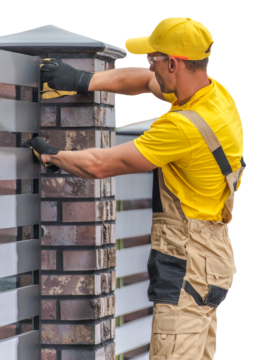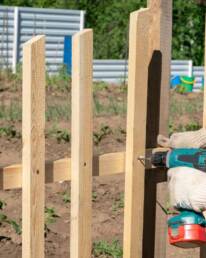As one of the most beautiful states in the country, Colorado is known for its majestic landscapes, snowy winters, and ever-changing weather patterns. While these dramatic shifts can be beautiful to witness, they also bring a unique set of challenges when it comes to maintaining your property. For homeowners and businesses alike, one of the most affected aspects of your property during the colder months is your fence.
Whether you have a wood, vinyl, metal, or chain link fence, winter can take its toll. The extreme cold, snow, ice, and fluctuating temperatures can cause damage to your fence, leading to costly repairs or the need for early replacement. However, with proper care and winter-proofing techniques, you can ensure that your fence remains strong and functional, no matter what Colorado’s harsh winter throws its way.
In this comprehensive guide, we’ll cover practical tips for winter-proofing your fence, focusing on how to protect it from Denver’s unpredictable weather. From routine maintenance to proactive measures, this guide will help you extend the life of your fence and keep it in great shape for years to come.
Why Winter-Proofing Your Fence Matters
Winter in Colorado can bring extreme weather conditions—freezing temperatures, heavy snowfall, and strong winds. These elements can create a significant amount of wear and tear on your fence. While it’s important to maintain your fence throughout the year, winter-proofing is especially critical because of the unique stresses that the cold and snow put on materials.
Here are a few of the reasons why winter-proofing your fence is essential:
- Preventing Damage: Cold weather can cause materials like wood, metal, and vinyl to crack, warp, or become brittle. Snow and ice can accumulate on the fence, causing additional weight that may lead to sagging or leaning. Frost heaving and ground shifts can also impact the foundation of your fence.
- Improving Longevity: A well-maintained fence will last longer. Winter-proofing helps extend its life by protecting it from winter elements, reducing the need for repairs or early replacement.
- Maintaining Aesthetic Appeal: Your fence plays a key role in the overall aesthetic of your property. Snow, ice, and cold temperatures can cause fading, discoloration, and other cosmetic issues. Regular maintenance ensures that your fence continues to look great, even during winter.
- Safety and Security: Fences provide security and privacy for your home or business. When winter conditions cause a fence to become unstable or damaged, it can compromise the security of your property. Ensuring your fence is winter-ready is an important step in maintaining its functionality.
Inspect Your Fence Before the Cold Sets In
The first step in winter-proofing your fence is to inspect it thoroughly before the colder weather arrives. This proactive approach will allow you to address potential issues before they become bigger problems once the snow starts falling. Here’s how to conduct a proper fence inspection:
- Check for Loose or Wobbly Posts: The foundation of your fence is crucial for its stability, especially during the winter months when ground freezing and thawing can shift the soil. Make sure that all posts are secure and standing upright. If a post is loose, it could be more vulnerable to falling over during a winter storm.
- Inspect for Cracks, Splits, or Warping: Cold temperatures can cause materials like wood and vinyl to crack or warp. Check for any visible cracks, splits, or warping along the panels, gates, and posts. Wooden fences are especially prone to moisture damage, so make sure there are no areas that could absorb water, leading to swelling or rotting when the temperatures drop.
- Look for Rust on Metal Fences: If you have a metal fence, rust is a common issue, especially in areas where snow and ice accumulate. Inspect your metal fence for signs of rust and address them before the cold weather exacerbates the problem. Pay close attention to the base of the posts and areas where moisture may linger.
- Examine Gates and Hinges: The gates on your fence are exposed to a lot of wear and tear, especially when you’re opening and closing them to allow access to your property. Make sure that gates swing properly and that the hinges are not rusted, damaged, or loose.
By addressing small issues during the inspection phase, you can prevent them from turning into bigger problems during the winter.
Clean Your Fence and Clear Debris
Before the winter weather sets in, it’s important to clean your fence thoroughly. Cleaning your fence not only improves its appearance, but it also helps remove debris, mold, or mildew that could trap moisture and contribute to deterioration.
For wood fences, washing off dirt, leaves, and other debris is especially important. Any organic material left on the wood will hold moisture and can contribute to mold growth, which is more likely to worsen in the cold and wet conditions of winter.
- Wood Fences: For wood fences, use a wood-safe cleaner or a diluted mixture of water and mild soap. Avoid harsh chemicals that could strip the wood of its natural oils or protective coatings.
- Vinyl Fences: Vinyl fences are easier to clean than wood and are less likely to absorb moisture. Simply use a garden hose and a mild soap solution to wash the panels, scrubbing away any dirt or debris.
- Metal Fences: Clean metal fences with a mixture of warm water and dish soap to remove dirt and grime. Make sure to rinse thoroughly to avoid soap residue.
Once your fence is clean, clear away any fallen leaves, twigs, or other debris around the base. These materials can trap moisture against your fence and contribute to the deterioration of the material, especially during the winter when snow and ice could become trapped in the debris.
Seal and Protect Your Fence from Moisture
Moisture is one of the biggest threats to your fence during winter, especially in Denver, where fluctuating temperatures cause constant freezing and thawing. Whether you have a wood, vinyl, or metal fence, sealing and protecting your fence from moisture is one of the best ways to winter-proof it.
- Wood Fences: Wood is especially vulnerable to moisture, which can lead to rotting, warping, and cracking. To protect your wood fence, apply a water-resistant sealant or stain designed for outdoor use. This will help prevent moisture from soaking into the wood and causing damage. It also acts as a barrier against snow and ice accumulation. Make sure to apply the sealant before the first frost.
- Vinyl Fences: Vinyl is naturally resistant to moisture, but it’s still important to check for any cracks or gaps where water could seep in. If necessary, use a vinyl-safe sealant to close any gaps.
- Metal Fences: For metal fences, a rust-resistant primer and paint can protect the material from moisture. Rust can form when water seeps into the metal, especially during freezing conditions, so make sure to apply a protective coat of paint before winter arrives.
Trim Back Plants and Trees Near Your Fence
While snow and ice can wreak havoc on your fence, one of the most common causes of fence damage during winter is overhanging branches. Heavy snow or ice can cause these branches to break or bend, putting unnecessary pressure on your fence.
Before winter arrives, take the time to trim back any trees or shrubs that are near your fence. Pay close attention to trees that are close to the fence line and have large, heavy branches. In addition, ensure that any ivy or climbing plants are properly managed and not allowed to grow into the fence.
This will help ensure that your fence is free from any added weight or pressure, preventing potential damage during snowstorms or freezing conditions.
Install a Snow Barrier
If you live in an area of Denver where heavy snowfall is common, you may want to consider installing a snow barrier near your fence. Snow barriers, typically made of wood or other sturdy materials, help prevent large snowdrifts from piling up against your fence and weighing it down.
Snow barriers are particularly useful for wood fences, which can bend or warp under the pressure of heavy snow accumulation. The barrier redirects the snow away from the fence, keeping it lighter and reducing the potential for damage.
Check the Fence Foundation
Finally, it’s important to check the foundation of your fence before the winter weather sets in. Freezing temperatures and shifting ground can affect the stability of your fence, particularly if the posts aren’t properly anchored.
Check that the posts are firmly set in concrete and that there are no signs of shifting or loosening. If you notice any problems, it’s better to address them early rather than waiting until the cold has caused more serious damage.
Conclusion
Winter in Denver, with its unpredictable mix of snow, freezing temperatures, and occasional thawing, presents a unique set of challenges for homeowners and business owners when it comes to maintaining their properties. The same weather that makes Colorado so scenic can also take a significant toll on your fence, causing deterioration, warping, rust, and other damage that can shorten its lifespan and diminish its function.
However, by investing a little time and effort into winter-proofing your fence, you can prevent these issues and ensure that your fence remains strong, functional, and aesthetically pleasing for years to come. Proper winter preparation not only protects the investment you’ve made in your fence but also ensures that your property remains secure and visually appealing throughout the winter months.
As we’ve discussed, there are several key steps that can help you safeguard your fence from winter damage:
- Inspection and Repair: By thoroughly inspecting your fence before the cold weather sets in, you can catch minor issues before they turn into major problems. Identifying loose posts, cracks, or rust spots early will allow you to make necessary repairs and avoid bigger, more costly fixes down the line.
- Cleaning and Clearing Debris: A simple cleaning session can do wonders for your fence’s longevity. Removing debris, leaves, and dirt from your fence prevents moisture buildup and helps to keep the fence looking its best. Clear any fallen branches, leaves, or vines that might trap moisture and damage your fence.
- Sealing and Moisture Protection: Moisture is a major contributor to fence deterioration, and taking steps to protect your fence from it can be incredibly beneficial. Applying a sealant to wood fences, using rust-resistant treatments for metal fences, and ensuring vinyl fences are crack-free are essential to keeping moisture from seeping into the material.
- Trimming Back Vegetation: Overhanging tree branches and climbing plants can put additional strain on your fence. Trimming these back before winter can prevent the weight of snow and ice from damaging your fence, while also ensuring that your fence continues to look neat and tidy throughout the season.
- Snow Barriers and Foundation Checks: In areas with heavy snowfall, using snow barriers and inspecting the foundation of your fence can further protect it from shifting or being weighed down by the elements. Ensuring that your fence is solidly anchored will prevent it from leaning or becoming unstable in extreme conditions.
By addressing these elements now, you are taking a proactive approach that will not only protect your fence but also enhance its ability to handle future winters. The result is a fence that provides the protection, privacy, and beauty you expect—year after year.
Why This Matters
While winter-proofing your fence may feel like a small task, it is part of the larger picture of maintaining your property’s integrity. A well-maintained fence can last much longer than one that is neglected, which means fewer repairs and replacements. This can save you money in the long run, as major fence repairs or replacements can be costly and time-consuming. More importantly, maintaining your fence will help you avoid the frustration of unexpected damage, ensuring that your fence is always there to serve its intended purpose, whether it’s for security, privacy, or simply adding to the curb appeal of your home or business.
In addition, winter-proofing your fence means that you’re taking a responsible, preventive approach to your property’s overall upkeep. The effects of Colorado’s harsh winters on your fence don’t just stop at the physical condition of the materials. In some cases, damaged fences can compromise your property’s security, making it easier for intruders to access your space. A sturdy, well-maintained fence offers peace of mind that your home or business is safe, especially when the cold weather keeps you indoors more often.
Professional Help When Needed
While many of the winter-proofing steps can be handled on your own, some property owners may prefer to enlist the help of professionals. If you’re not sure how to properly seal your fence, handle rust issues, or check the stability of your posts, contacting a reputable fence contractor can be a wise decision. Denco Fence specializes in fence installation, repair, and maintenance, and we can assist with ensuring that your fence is fully prepared for the winter season.
Our team of experts can perform an in-depth inspection, provide the right treatments, and help you address any potential weaknesses before they become major issues. This will not only save you time but will also ensure that your fence is properly protected against Colorado’s challenging winter weather. Whether you need a simple maintenance check or more advanced repairs, we’re here to provide the expertise and care your fence needs to weather the storm.
Looking Ahead: Ensuring Year-Round Protection
Winter is just one season out of four, and your fence will be exposed to various elements throughout the year. Ensuring that your fence is ready for all seasons is an ongoing process that includes summer sun, spring rains, fall leaves, and, of course, winter snow. The practices of winter-proofing your fence can also carry over into year-round maintenance that keeps it standing strong in the face of any challenge.
Spring and summer bring their own considerations, such as potential for growth of plant life near your fence or the effects of intense heat and UV rays on certain materials. By staying vigilant and proactive in maintaining your fence, you can keep it in optimal condition for all seasons, ensuring that it continues to serve its purpose and look great year-round.
Final Thoughts
Winter in Denver can be harsh, but with proper care and attention, your fence can withstand the cold, snow, and ice, continuing to provide security, privacy, and aesthetic value. Winter-proofing your fence isn’t just about protecting it from immediate damage—it’s about making an investment in the longevity and durability of your property. By taking the necessary steps to protect your fence before winter sets in, you can ensure that it remains in excellent shape for years to come, all while preventing the frustration and expense of unexpected repairs.
Remember, winter-proofing your fence isn’t a one-time task—it’s an ongoing commitment to ensuring that your fence is properly maintained and ready for whatever nature throws its way. And, should you need help, Denco Fence is always here to lend a hand, offering expert advice, professional services, and the craftsmanship you need to make sure your fence stands strong no matter the season.
Contact Denco Fence today for a consultation or to learn more about how we can help you winter-proof your fence and keep it in top condition all year long. Don’t wait until the snow hits—get started on winterizing your fence now, and enjoy the peace of mind that comes with knowing your fence will handle whatever Colorado’s winter brings!

Need an expert opinion? Talk to our experts today!
When you talk to our experts at Denco Fence Company, we’ll help you compare fence styles, share design ideas, and answer any questions along the way. If you’re looking to build or repair a fence that you and your neighbors are going to love, get a free estimate and let us help bring your project to life.

